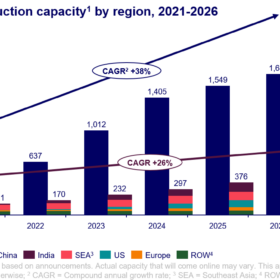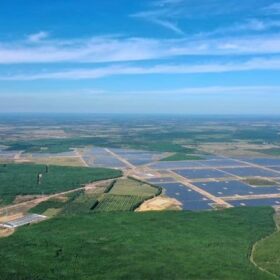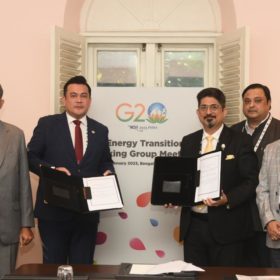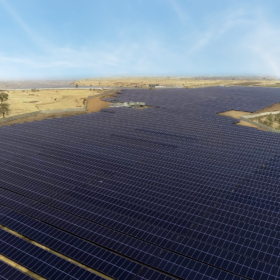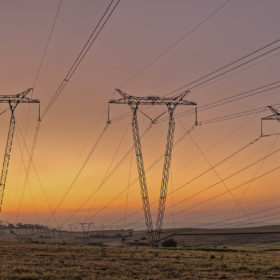India’s solar PV module exports soared 23 times between FY 2022 and FY 2024
The nation can potentially replace Southeast Asia countries as a top solar PV product exporter to the US, according to a joint report by IEEFA and JMK Research.
India will overtake Southeast Asia as the second-largest solar module producer by 2025
A Wood Mackenzie report forecasts China will dominate solar manufacturing through 2026, holding more than 80% of poly, wafer, cell and module manufacturing capacity for the next three years.
Southeast Asia solar markets set for growth this year
New PV capacity additions in Southeast Asia are expected to bounce back this year for the first time since 2020, according to the Asian Photovoltaic Industry Association. The market is expected to grow by 13% in 2023, for 3.8 GW of new installations.
India signs MoU on energy efficiency programmes in Indonesia, Malaysia and Thailand
India’s Energy Efficiency Services Ltd has agreed to provide technical advisory, project management, contracting and implementation support for energy efficiency programmes in Indonesia, Malaysia, and Thailand.
India terminates solar cell anti-dumping probe
India’s Directorate General of Trade Remedies, an entity under the Ministry of Commerce and Industry, has terminated an anti-dumping probe into solar cells coming from China, Thailand, and Vietnam as domestic manufacturers withdraw the application.
Keppel Corporation-led consortium to acquire majority stake in Cleantech Solar
Cleantech Solar has over 600 MWp of solar portfolio across India and Southeast Asia and aims to achieve a cumulative generation capacity of 3 GW over the next five years.
Larsen & Toubro secures transmission line, substation orders
The Indian multinational EPC contractor has been awarded significant power transmission and distribution contracts in Ladakh and Ayodhya, in addition to overseas projects in Saudi Arabia, Africa and Thailand.
ISA, MNRE, and World Bank conduct inception workshop for ‘One Sun One World One Grid’ program
‘One Sun One World One Grid’ is a global supergrid project proposed by India for seamless sharing of renewable energy resources among countries. The inception workshop was attended by more than 160 experts and discussed the roadmap of the project.
India launches anti-dumping probe for solar cells from China, Thailand and Vietnam
The Directorate General of Trade Remedies (DGTR) under the commerce ministry stated the Indian manufacturers provided sufficient evidence to warrant the initiation of an investigation into the alleged dumping of solar cells. The investigation will aim to determine the existence, degree and effect of the dumping and recommend an amount of anti-dumping duty to offset the material injury to domestic manufacturers.
Covid impact: Solar imports dipped 75% in ten months
Coronavirus disruption has been cited as the chief culprit as imports from China, Thailand and Vietnam slumped from April to January, but safeguarding duty also appears to have had an impact, with unaffected imports from nations such as Myanmar, Chad and Russia on the rise and Malaysian trade keeping steady.

